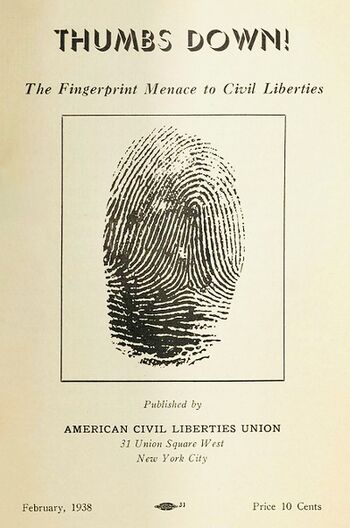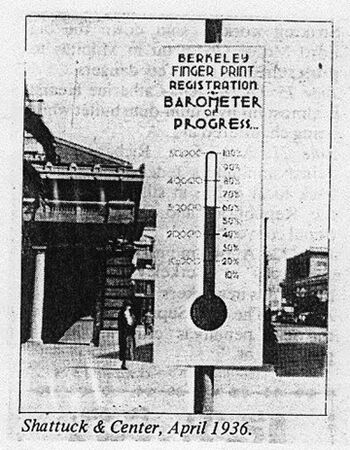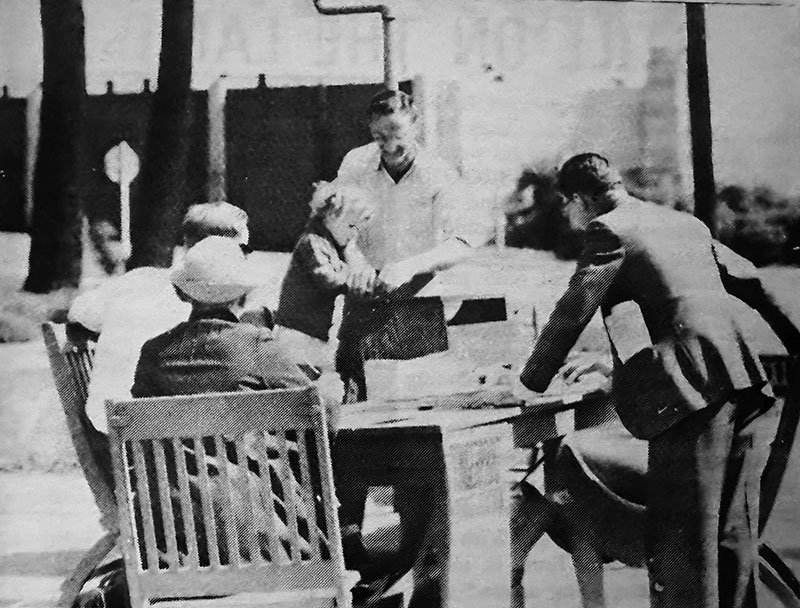Berkeley Goes Fingerprint Crazy
Historical Essay
©️ Kenneth Stein, 2023
Originally published in Grassroots: Berkeley's Community Newspaper in June 1982.
Pamphlet Cover: “THUMBS DOWN! The Fingerprint Menace to Civil Liberties,” Published by AMERICAN CIVIL LIBERTIES UNION, New York City, February, 1938
Photo Courtesy Ken Stein
"BERKELEY GOES BERSERK." There it was in black and white. Perhaps the earliest reference to Berkeley going Berserk.
Hippies? Draft resisters? 1960s? Nope.
Junior Chamber of Commerce, 1936.
The source is a 1938 American Civil Liberties Union pamphlet entitled, “THUMBS DOWN: The Fingerprint Menace to Civil Liberties,” [right] which deals with the campaign for universal fingerprinting that began after World War I and continued through the 1930s.
According to this pamphlet, this period saw "a number of bills introduced to compel universal fingerprinting or the fingerprinting of special groups including aliens, automobile drivers, service workers, and Negroes." By the mid-1930s, we are told, "Generalissimo of the Movement was J. Edgar Hoover, head of the F.B.I."
It was the ACLU's position that the movement toward mandatory and even voluntary fingerprinting was part of a general scheme for the compulsory regimentation of the entire population.
According to the pamphlet, "Had the advocates of digital registration been cleverer in their early approach, they might have foisted drastic measures upon the nation, might have sharply curtailed civil liberties. Their efforts, however, were crude, haphazard and decentralized. Until the advent of [FBI Director] J. Edgar Hoover.'
Through a program of education, Hoover and the organization supporting him began to speak of "voluntary" fingerprinting, urging that all citizens, for their own protection, rush to the nearest police station to have their fingerprints recorded. The pamphlet suggests that "voluntary fingerprinting is a deceptive phrase, as when an employer requests fingerprints, most employees feel it wiser to acquiesce.
When sufficient numbers have been fingerprinted on a voluntary basis," the ACLU warned prophetically, "laws will be passed compelling the entire population to be registered."
And so, newspapers began to carry releases emanating from Hoover's press agents, with photographs showing notables from General Pershing to Walt Disney in the act of being fingerprinted. National magazines began carrying crusading articles "originating in the sanctums of the F.B.I. and appealing to vanity, prejudice, fear, and love, in an effort to cajole the public into submitting."
Which brings us to the section of the pamphlet alluded to earlier, namely:
BERKELEY GOES BERSERK
"There is a certain grim humor about the way Berkeley, California, plunged into this campaign in 1936. Fingerprint 'service' stations were set up in public buildings and on street corners all over town. These booths were manned - with what authority is not evident - by workers from the rolls of the Works Progress Administration and the National Youth Administration. The city's newspapers pleaded with the citizenry not to deprive themselves of this happy solution to all evils."
In a typical example, the Berkeley Gazette reported on May 19, 1936, that "Many thousands of people die annually without their identity ever becoming known to sorrowing relatives to whom they merely remain as missing."
The article then relates “a case illustrating exceptionally well what can be done with fingerprints." The case involves the finding of a body in a cabin in the high Sierras. The man had starved to death. His prints were identified by the FBI as a communist who was in the country illegally. Among his effects was a 'Red flag with the crossed hammer and sickle."
"Placards, banners, car-cards and throw-aways were placed in every convenient spot. All good Americans should be glad to give their fingerprints,' bellowed a crew of three-minute speakers before luncheon clubs—and policemen were on hand with the necessary paraphernalia.
"'Good' citizens were given merit cards which they could frame in their windows for all to see. These cards bore the legend, in boldface type, 'I have been fingerprinted.’ Society ladies attended combination bridge and fingerprint parties. Robert Gordon Sproul, President of the University of California, graciously consented to have his fingerprints taken with the newsreel cameras grinding away. The Merchants' Association magnanimously did its bit by offering a five percent discount to all customers who had been fingerprinted.
Shattuck & Center, April 1936. Berkeley Fingerprint Registration Barometer of Progress, indicating 60% of goal reached.
Photo courtesy Berkeley Historical Society
"Pressure was exerted upon those recalcitrant creatures who felt they were well enough off without having their finger marks on record. As for factory and clerical workers, it was felt they could be approached without this fanfare. Their prints were taken, as one account describes it, 'without the benefit of three-minute speakers.' There is evidence to show intimidation and coercion on the part of many employers, who later displayed placards bearing witness that "The employees of this establishment have been 100% fingerprinted.'
About 50,000 prints are said to have been obtained." Each person fingerprinted was also given a Personal Identification card, with name, address and fingerprints on one side and a statement on the back indicating that "one copy of this physiological autograph is filed in the civilian registration bureau of the U.S. Dept. of Justice, Washington, D.C., and another in the civilian registration files of this city."
HAVE NO FEAR
By the end of the drive, which lasted for about 5 months, American Legionnaires going door-to-door reported that in many neighborhoods they were unable to locate any Berkeleyans who had not been fingerprinted. It should be noted that Berkeley has the curious distinction of being the first, and probably only, city in the country to ever mount a campaign to fingerprint all of its citizens. Or as the Berkeley Gazette crowed in early 1936, "Thousands of Berkeleyans have no fear of becoming victims of amnesia, fraud, or impersonation by criminals.”
WHO’S BEHIND IT
As for how all of this arrived at Berkeley's doorstep, the ACLU pamphlet states that "the sponsor of Berkeley's little spree was the California Junior Chamber of Commerce, a branch of the National Junior Chamber. Its full fingerprint program provided for (1) the arrest of any individual refusing to be fingerprinted; (2) the right of an officer to stop anyone under any circumstances and ask for his prints; (3) the arrest of anyone giving employment to a person not finger-printed; and (4) the prosecution of any person moving from one part of town to another without notifying the police.”
This section of the pamphlet, entitled "Who's Behind the Drive” continues, "The Prospectus of the Junior Chamber of Commerce for a better life in America contains too, this frank provision: 'A law should be passed under the terms of which an individual convicted of revolutionary activity should be incarcerated, and continually held in a concentration camp.' Working with the Chamber of Commerce were the Lions, the Kiwanis and Rotary International, the Knights of Columbus, the Scouts, and the Berkeley Nationals. The last group obtained notoriety during the west-coast strike of 1934, when its members took pick-axes and broke up the meeting halls and homes of workers.
Fingerprint Service Station—The photo is of a little girl maybe three or four years old being fingerprinted with the help of (probably) her dad.
Photo courtesy Berkeley Historical Society
"Nationally, the crusade of the fingerprint experts is supported and financed by the FBI in cooperation with large organizations, including the U.S. Chamber of Commerce and, as in Berkeley, its local affiliates everywhere; the National Manufacturers Association; the American Bankers Association; the Daughters of the American Revolution; the American Legion; the Hearst newspaper empire; and the American Coalition, subtitled ‘An Organization to Coordinate the Efforts of Patriotic, Civic and Fraternal Societies to keep America American.' President of the American Coalition is John B. Trevor, a wealthy lawyer who has a phobia against foreigners and who engineers much of the anti-alien activity in the United States.”
The pamphlet also quotes from an article in Nation's Business which reads, in part, "Our unemployment situation would be aided by as many as 2,000,000 jobs if the aliens improperly in this country were shipped back where they belong. The relief burden would likewise be eased tremendously. Maybe we'll grow poor enough so we'll decide to do this fingerprinting and deport the ones we don't want back home."
"Who's Behind the Drive" concludes, "Here then is a line-up of sponsors who wield vast influence, possess tremendous resources. Yet despite their endeavors, despite the acquisition of the capable Mr. Hoover to head their campaign, they have thus far not been notably successful in fingerprinting the great mass of Americans."
From the 1930s to the present, the closest we've come to universal fingerprinting has been the "voluntary' (nobody is ever told it is voluntary) thumbprinting one submits to when applying for a driver's license or state I.D. card. Effective July 1, 1982. however, a new California state law (AB 52) goes into effect, making thumbprinting mandatory for all such applications.
According to Elaine Elinson of the S.F. chapter of the ACLU, "This law has been coming up every year, but this year we weren't able to stop it." Elinson says that "part of the reason we have consistently lobbied so hard against it is because of the Department of Motor Vehicle's policy of routinely sending names of people who refuse to be fingerprinted to the FBI." She adds, “The fact that a criminal law enforcement agency would have your prints on file totally belies the presumption of 'innocent until proven guilty, which is supposed to be the foundation of our legal system. After all, we're talking about people who haven't even been accused of committing a crime.”
A lifelong disability rights advocate, Ken Stein is a Co-Founder and Past President of the Berkeley Historical Society



